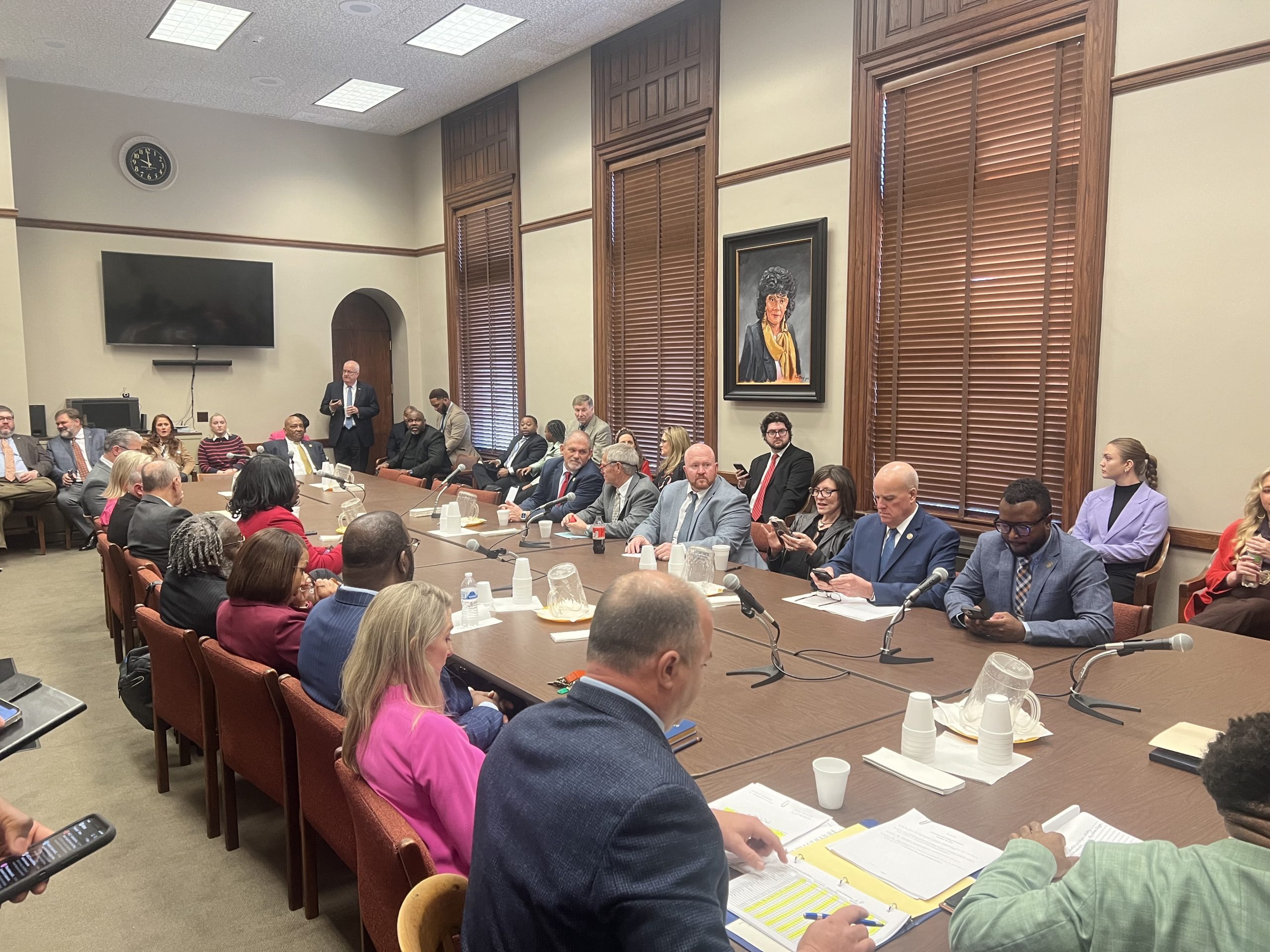Mississippi Today
House committee passes bill expanding college financial aid to adult, part-time students

The House Colleges and Universities Committee advanced a bill Wednesday to increase award amounts and expand eligibility to more Mississippians under the state’s largest college financial aid program.
Under House Bill 994, adult, part-time and low-income college students would be able to receive the Mississippi Resident Tuition Assistance Grant. All told, an estimated 37,000 more Mississippians, many who don’t receive any form of state financial aid for college, would be eligible for MTAG.
Depending on a student’s income and academic year, the bill would increase MTAG award amounts to a maximum of $2,000. This would be the first time the Legislature has increased MTAG awards since the program was created in the 1990s to benefit middle-class Mississippians who aren’t eligible for the federal Pell Grant.
“It opens it up to every Mississippian out there,” said House Chair Donnie Scoggin, R-Ellisville, the bill sponsor. “From the poorest of the poor to the richest of the rich, there is some benefit.”
Though the bill has broad support, Scoggin said it faces a major hurdle: The cost. To fully fund the program, lawmakers would need to greenlight upwards of $30 million in additional spending. Last year, Mississippi spent just under $10 million on MTAG.
But Scoggin is hoping to convince lawmakers to see the changes as an investment in Mississippi’s workforce. He said it doesn’t matter how much the state of Mississippi spends on workforce development programs if potential students can’t afford to attend.
“My argument would be, very simply: Education is the future,” Scoggin said. “We’ve got to do something to help people go to college.”
During the committee meeting, Scoggin told members the bill is supported by community colleges and universities whose disagreement last year was one reason his proposal failed last session. That plan also sought to overhaul the Higher Education Legislative Plan for Needy Students, or HELP, grant.
The Mississippi Economic Council is also supporting this bill, which Scoggin worked on closely with the Office of Student Financial Aid and its director, Jennfier Rogers. After the committee meeting, multiple lawmakers came up to Rogers to tell her they supported the bill.
Rogers said that she worked on the proposal with a taskforce to set higher MTAG award amounts without increasing the overall cost of the program too much. Though it’s hard to say if the increased award amounts would be enough to affect student behavior, Rogers said studies have shown increasing grant aid has a positive impact on college graduation rates.
“I wish we could increase them more,” she said. “I think the award amounts need to be larger. But this is a reasonable first step.”
MTAG has lost significant buying power since it was created in 1995.
That year, the award amounts under MTAG for freshmen and sophomores covered roughly 10% of the average four-year, in-state tuition, room and board, and 20% for juniors and seniors, according to an analysis of federal data. In fall 2021, MTAG covered 2% of tuition, room and board for freshmen and sophomores, and 5% for juniors and seniors.
Scoggin said he doesn’t know yet where the money would come from to fund the bill, and that it will face competition from other initiatives.
“I think this is a priority, but someone else may think roads and bridges are a priority or someone else may think expanding Medicaid is a priority,” he said.
Scoggin said Republicans need to balance tax cuts with programs that can help Mississippians take personal responsibility.
“We’re trying to limit the government, but in doing that, we’re still trying to get people into that workforce development,” he said.
This article first appeared on Mississippi Today and is republished here under a Creative Commons license.![]()
Mississippi Today
MS House member agrees to pre-trial program after indictment
Rep. Keith Jackson, a Democratic lawmaker from Kemper County, can remain in office despite a felony indictment by participating in a pre-trial intervention program, according to court documents.
A grand jury last year indicted Jackson, a first-term House member, on charges of receiving stolen property – specifically, a 2006 Magnolia timber trailer worth about $15,000. The grand jury also indicted two other people, Fredwrick (sic) Young and William Tate, in connection with the criminal charges.
Jackson did not respond to a request for comment, and his attorney, Christopher Collins, declined to comment.
Cassie Colman, the district attorney in the 10th circuit district, told Mississippi Today that the state agreed to let Jackson participate in pretrial intervention because he had no prior criminal record. If Jackson completes the terms of the pre-trial agreement, then the criminal charges will be expunged from his record.
Going to trial would likely be risky for the lawmaker because, if convicted of the offense, he could lose the right to hold elected office.
Receiving stolen property is a disenfranchising crime in Mississippi, and if someone is convicted of a disenfranchising crime, they lose their right to vote. To run for office in Mississippi, someone must be a registered voter.
But Coleman, who prosecuted the case against Jackson, said the legislator’s agreement to enter the program is neither a guilty plea nor a conviction. Instead, he will enroll in the intervention program for at least a year and pay around $3,350 in fees, according to court documents.
If he fails to meet the terms of the agreement, the district attorney could remove him from the program and prosecute him for the original crime.
This article first appeared on Mississippi Today and is republished here under a Creative Commons Attribution-NoDerivatives 4.0 International License.
Note: The following A.I. based commentary is not part of the original article, reproduced above, but is offered in the hopes that it will promote greater media literacy and critical thinking, by making any potential bias more visible to the reader –Staff Editor.
Political Bias Rating: Centrist
The article presents factual information about a Mississippi House member’s legal situation, focusing on the details of the pre-trial intervention program and the potential consequences if he fails to meet the terms. There is no overt political commentary or slant, and it primarily reports on the legal process and actions taken by both the accused lawmaker and the prosecuting district attorney. The tone is neutral, and it avoids sensationalizing the case or making political judgments. Given the absence of opinion or partisanship, the content is categorized as centrist.
Mississippi Today
On this day in 1951, Ruby Hurley opened NAACP office in South
April 28, 1951

Ruby Hurley opened the first permanent office of the NAACP in the South.
Her introduction to civil rights activism began when she helped organize Marian Anderson’s 1939 concert at the Lincoln Memorial. Four years later, she became national youth secretary for the NAACP. In 1951, she opened the organization’s office in Birmingham to grow memberships in Alabama, Florida, Georgia, Mississippi and Tennessee.
When she arrived in Mississippi, there were only 800 NAACP members. After the governor made remarks she disagreed with, she wrote a letter to the editor that was published in a Mississippi newspaper. After that step in courage, membership grew to 4,000.
“They were surprised and glad to find someone to challenge the governor,” she told the Chicago Defender. “No Negro had ever challenged the governor before.”
She helped Medgar Evers investigate the 1955 murder of Emmett Till and other violence against Black Americans. Despite threats, she pushed on.
“When you’re in the middle of these situations, there’s no room for fear,” she said. “If you have fear in your heart or mind, you can’t do a good job.”
After an all-white jury acquitted Till’s killers, she appeared on the front cover of Jet magazine with the headline, “Most Militant Negro Woman in the South.”
Months later, she helped Autherine Lucy become the first Black student at the University of Alabama.
For her work, she received many threats, including a bombing attempt on her home. She opened an NAACP office in Atlanta, where she served as a mentor for civil rights leader Vernon Jordan, with whom she worked extensively and who went on to serve as an adviser to President Bill Clinton.
After learning of Evers’ assassination in 1963, she became overwhelmed with sorrow. “I cried for three hours,” she said. “I shall always remember that pool of blood in which he lay and that spattered blood over the car where he tried to drag himself into the house.”
She died two years after retiring from the NAACP in 1978, and the U.S. Post Office recognized her work in the Civil Rights Pioneers stamp series. In 2022, she was portrayed in the ABC miniseries, “Women of the Movement.”
This article first appeared on Mississippi Today and is republished here under a Creative Commons Attribution-NoDerivatives 4.0 International License.![]()
Note: The following A.I. based commentary is not part of the original article, reproduced above, but is offered in the hopes that it will promote greater media literacy and critical thinking, by making any potential bias more visible to the reader –Staff Editor.
Political Bias Rating: Centrist
This content is primarily focused on the historical and personal achievements of Ruby Hurley, a civil rights activist. It emphasizes her dedication and bravery in challenging oppressive systems and advocating for racial justice. The narrative does not appear to endorse or criticize any contemporary political positions but highlights Hurley’s work with the NAACP and her role in significant civil rights events. While it mentions her opposition to certain government figures and the threat she faced, the tone is largely factual and centered on her contributions to history, which supports a centrist position without leaning toward a particular ideological side.
Mississippi Today
Podcast: Mississippi citizens often left in the dark on special-interest lobbying of politicians
The post Podcast: Mississippi citizens often left in the dark on special-interest lobbying of politicians appeared first on mississippitoday.org
Note: The following A.I. based commentary is not part of the original article, reproduced above, but is offered in the hopes that it will promote greater media literacy and critical thinking, by making any potential bias more visible to the reader –Staff Editor.
Political Bias Rating: Center-Left
This content reflects a Center-Left bias primarily due to its focus on transparency issues regarding special-interest spending and lobbying in Mississippi. The mention of negative implications associated with lobbying efforts suggests an advocacy for accountability and reform, which aligns with a progressive stance often seen in Center-Left discourse. Additionally, the subject matter, involving regulation of online sports betting, typically garners support from more liberal perspectives concerned about consumer protection and ethical governance.
-

 SuperTalk FM6 days ago
SuperTalk FM6 days agoNew Amazon dock operations facility to bring 1,000 jobs to Marshall County
-

 News from the South - Missouri News Feed2 days ago
News from the South - Missouri News Feed2 days agoMissouri lawmakers on the cusp of legalizing housing discrimination
-

 News from the South - Alabama News Feed7 days ago
News from the South - Alabama News Feed7 days agoPrayer Vigil Held for Ronald Dumas Jr., Family Continues to Pray for His Return | April 21, 2025 | N
-

 News from the South - Florida News Feed6 days ago
News from the South - Florida News Feed6 days agoTrump touts manufacturing while undercutting state efforts to help factories
-

 News from the South - Florida News Feed6 days ago
News from the South - Florida News Feed6 days agoFederal report due on Lumbee Tribe of North Carolina’s path to recognition as a tribal nation
-

 Mississippi Today4 days ago
Mississippi Today4 days agoStruggling water, sewer systems impose ‘astronomic’ rate hikes
-

 News from the South - Oklahoma News Feed6 days ago
News from the South - Oklahoma News Feed6 days agoOklahoma Treasurer’s Office Faces Scrutiny Over Use of Signal in Anti-ESG Coordination
-

 Mississippi Today1 day ago
Mississippi Today1 day agoDerrick Simmons: Monday’s Confederate Memorial Day recognition is awful for Mississippians













































